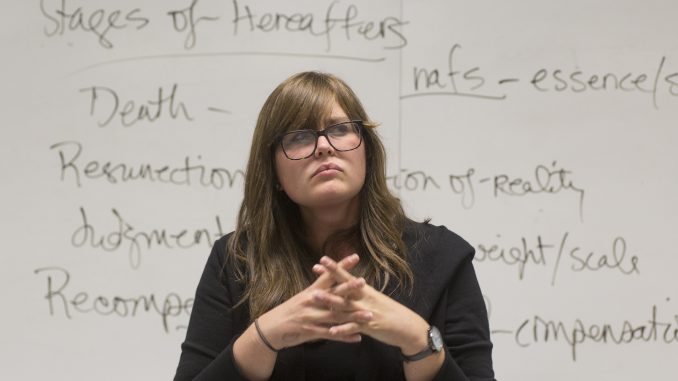
“Death is very real, very emotional and very stressful—why not wrap your head around it?” said Defibaugh, who teaches “Death and Dying,” a three-credit course in Temple’s religion department.
This class is a requirement for religion majors and an upper-level elective for all students.
This course touches on areas like politics and culture, but through the lens of death, and even some of the more outlandish topics involving death.
“The first half of the class talks about religious [death] traditions and the second half of the class focuses on social and political issues in the United States, so we talk about euthanasia, suicide and sometimes zombies,” Defibaugh said.
“Death and Dying” also goes in-depth about how individuals and their loved ones prepare for death differently in religions like Christianity, Judaism and Islam. In much the same way different religions handle death, the multiple sections for the course and their professors also approach the topic in a variety of ways.
“The beauty of this course is that each professor teaches “Death and Dying” differently,” Defibaugh said.
She and her 25 students learn about the grieving process after losing a pet, based on her experiences as a lead facilitator for a grief support group at the local Queenie’s Pets.
“It’s different than any other classes I’m taking,” said Shaniece Hernandez, a junior psychology major. “The class gives you a different perspective by learning about other cultures.”
“I like the topics we cover, it adds a broader perspective on how certain religions prepare for death,” said Chelsea Webb, a senior psychology major.
During class, students discuss articles from authors who explain the funeral process in different cultures. One particular author is Amina Wadud, a feminist scholar who explains the five stages of the “hereafter” which include death, resurrection, judgement, recompense and heaven.
There will also be guest speakers throughout the semester like one who will give a lecture on death in comics, which will be open to the public.
Although the class can be taken as an elective, Defibaugh heavily emphasizes that it will be writing-intensive which she feels is valuable to students willing to do the work.
“I hope that they can engage in academic scholarship and critical thinking and improving their writing skills,” Defibaugh said.
By the end of the semester, students are required to write a final research paper on a topic of their choice.
“I leave it open so that students can pick something that they are interested in,” she said. “This is a chance for students to pick up where I left off and discuss topics that they are interested in that I may not have covered in class.”
Aaron Klapper, a senior psychology major, chose to research the afterlife among atheists. He believes the course is a time to examine what could be beyond death.
Other topics students chose to write their papers on include suicide in different time periods, near death experiences, burials in Ireland and homicide in North Philadelphia within the last ten years.
“I have a general appreciation for faith,” Klapper said. “I find it inspirational and beautiful when people can see past what is beyond themselves and what they can see and perceive.”
“One thing that I will take away from this course is having hope in something that is beyond this world,” he added.
Tatyana Turner can be reached at tatyana.turner@temple.edu.
Video shot by Eurica Yu and edited by Sean Brown.



Be the first to comment